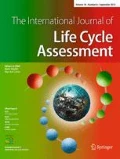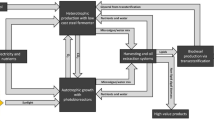Abstract
Purpose
Microalgae biodiesel has attracted considerable attention as a potential substitute for fossil fuels and biodiesel from food crops. Nevertheless, its reported climate impacts in the scientific literature vary significantly. This article describes and synthesizes the range of results found in the life cycle assessment (LCA) literature regarding microalgae biodiesel studies to investigate whether particular parameters, e.g. technologies, were associated with higher or lower greenhouse gas (GHG) emissions so that a best practice can be inferred from currently available LCA data and thereby recommended.
Methods
A systematic literature review and meta-regression analysis (MRA) of 36 LCA studies that report on the GHG emissions of microalgae biodiesel was conducted. An assessment of key aspects, including modelling choices and technologies, was performed. Furthermore, MRA models were formulated considering several variables of interest describing both technical and modelling choices to identify the main causes for the variability in GHG emissions per MJ of biodiesel. Variables chosen include: microalgae species; culture medium; cultivation system; source of CO2; extraction technology; conversion technology; system boundary; geographical scope; inclusion or exclusion of capital goods; and how multifunctionality was handled.
Results and discussion
The reviewed studies altogether reported 308 results ranging from −0.7 to 3.8 kg CO2 eq. MJ−1biodiesel, portraying 19 different system configurations. Despite the comprehensive range of variables assessed, the models generated could not plausibly explain that the variability in GHG emissions depends either on the technologies considered or on the methodological choices adopted. However, the following relationships could be observed: location in Europe and high oil productivity were associated with lower emissions, whilst dry extraction should be avoided for leading to higher GHG emissions, on average.
Conclusions
There is a large degree of variability within the technologies considered, as well as the methodological choices adopted, so that no robust conclusions could be drawn from the MRA. Notwithstanding, average GHG emissions reported were more than twice as high as fossil diesel and, while there are some studies showing large benefits, none of the various algae technologies performed consistently better than fossil diesel, questioning the climate-mitigation potential of microalgae biodiesel.




Similar content being viewed by others
References
Adesanya VO, Cadena E, Scott SA, Smith AG (2014) Life cycle assessment on microalgal biodiesel production using a hybrid cultivation system. Bioresour Technol 163:343–355. https://doi.org/10.1016/j.biortech.2014.04.051
Aguinis H, Gottfredson RK, Joo H (2013) Best-practice recommendations for defining, identifying, and handling outliers. Organ Res Methods 16:270–301. https://doi.org/10.1177/1094428112470848
Batan L, Quinn J, Bradley T, Willson B (2011) Net energy and greenhouse gas emissions evaluation of biodiesel derived from microalgae. Environ Sci Technol 45:1160–1160. https://doi.org/10.1021/es1038479
Bello M, Ranganathan P, Brennan F (2017) Life cycle optimization for sustainable algal biofuel production using integrated nutrient recycling technology. ACS Sustain Chem Eng 5:9869–9880. https://doi.org/10.1021/acssuschemeng.7b01833
Bennion EP, Ginosar DM, Moses J, Agblevor F, Quinn JC (2015) Lifecycle assessment of microalgae to biofuel: comparison of thermochemical processing pathways. Appl Energy 154:1062–1071. https://doi.org/10.1016/j.apenergy.2014.12.009
Brentner LB, Eckelman MJ, Zimmerman JB (2011) Combinatorial life cycle assessment to inform process design of industrial production of algal biodiesel. Environ Sci Technol 45:7060–7067. https://doi.org/10.1021/es2006995
Campbell PK, Beer T, Batten D (2011) Life cycle assessment of biodiesel production from microalgae in ponds. Bioresour Technol 102:50–56. https://doi.org/10.1016/j.biortech.2010.06.048
Carneiro MLNM, Pradelle F, Braga SL, Gomes MSP, Martins ARFA, Turkovics F, Pradelle RNC (2017) Potential of biofuels from algae: comparison with fossil fuels, ethanol and biodiesel in Europe and Brazil through life cycle assessment (LCA). Renew Sust Energ Rev 73:632–653. https://doi.org/10.1016/j.rser.2017.01.152
Chowdhury R, Freire F (2015) Bioenergy production from algae using dairy manure as a nutrient source: life cycle energy and greenhouse gas emission analysis. Appl Energy 154:1112–1121. https://doi.org/10.1016/j.apenergy.2015.05.045
Collet P, Hélias A, Lardon L, Steyer JP, Bernard O (2015) Recommendations for life cycle assessment of algal fuels. Appl Energy 154:1089–1102. https://doi.org/10.1016/j.apenergy.2015.03.056
Collet P, Lardon L, Hélias A, Bricout S, Lombaert-Valot I, Perrier B, Lépine O, Steyer JP, Bernard O (2014) Biodiesel from microalgae - life cycle assessment and recommendations for potential improvements. Renew Energy 71:525–533. https://doi.org/10.1016/j.renene.2014.06.009
Collotta M, Busi L, Champagne P, Mabee W, Tomasoni G, Alberti M (2016) Evaluating microalgae-to-energy -systems: different approaches to life cycle assessment (LCA) studies. Biofuels Bioprod Biorefin 10:883–895. https://doi.org/10.1002/bbb.1713
Connelly EB, Colosi LM, Clarens AF, Lambert JH (2015) Life cycle assessment of biofuels from algae hydrothermal liquefaction: the upstream and downstream factors affecting regulatory compliance. Energy and Fuels 29:1653–1661. https://doi.org/10.1021/ef502100f
Cox K, Renouf M, Dargan A, Turner C, Klein-Marcuschamer D (2014) Environmental life cycle assessment (LCA) of aviation biofuel from microalgae, Pongamia pinnata, and sugarcane molasses. Biofuels Bioprod Biorefin 8:579–593. https://doi.org/10.1002/bbb.1488
European Parliament Union, Council of the European Union (2018) Directive (EU) 2018/2001 of the European Parliament and of the Council of 11 December 2018 on the promotion of the use of energy from renewable sources. Off J Eur Union 328:82–209
Figueiredo F, Garcia R, Castanheira E, Malça J, Freire F, Brandão M, Frank ED, Eng AG, Cowie A, Laurens LML (2017) Sustainability and life-cycle assessment of algal bioenergy. In: Laurens LML (ed) State of technology review – algae bioenergy. IEA bioenergy, pp 82–94
Figueiredo F, Garcia R, Margarida SG, Castanheira EG, Malça J, Oliveira AC, Matos C, Freire F (2015) Life-cycle assessment of microalgae biodiesel: a review. Energy for Sustainability 2015 - Sustainable cities: designing for people and the planet. Coimbra, Portugal
Fortier M-OP, Roberts GW, Stagg-Williams SM, Sturm BSM (2014) Life cycle assessment of bio-jet fuel from hydrothermal liquefaction of microalgae. Appl Energy 122:73–82. https://doi.org/10.1016/j.apenergy.2014.01.077
Frank ED, Elgowainy A, Han J, Wang Z (2013) Life cycle comparison of hydrothermal liquefaction and lipid extraction pathways to renewable diesel from algae. Mitig Adapt Strateg Glob Chang 18:137–158. https://doi.org/10.1007/s11027-012-9395-1
Frank ED, Han J, Palou-Rivera I, Elgowainy A, Wang MQ (2012) Methane and nitrous oxide emissions affect the life-cycle analysis of algal biofuels. Environ Res Lett 7. https://doi.org/10.1088/1748-9326/7/1/014030
Gollakota ARK, Kishore N, Gu S (2018) A review on hydrothermal liquefaction of biomass. Renew Sust Energ Rev 81:1378–1392. https://doi.org/10.1016/j.rser.2017.05.178
Goyal HB, Seal D, Saxena RC (2008) Bio-fuels from thermochemical conversion of renewable resources: a review. Renew Sust Energ Rev 12:504–517. https://doi.org/10.1016/j.rser.2006.07.014
Hou J, Zhang P, Yuan X, Zheng Y (2011) Life cycle assessment of biodiesel from soybean, jatropha and microalgae in China conditions. Renew Sust Energ Rev 15:5081–5091. https://doi.org/10.1016/j.rser.2011.07.048
Khoo HH, Sharratt PN, Das P, Balasubramanian RK, Naraharisetti PK, Shaik S (2011) Life cycle energy and CO2 analysis of microalgae-to-biodiesel: preliminary results and comparisons. Bioresour Technol 102:5800–5807. https://doi.org/10.1016/j.biortech.2011.02.055
Liu X, Clarens AF, Colosi LM (2012) Algae biodiesel has potential despite inconclusive results to date. Bioresour Technol 104:803–806. https://doi.org/10.1016/j.biortech.2011.10.077
Liu X, Saydah B, Eranki P, Colosi LM, Greg Mitchell B, Rhodes J, Clarens AF (2013) Pilot-scale data provide enhanced estimates of the life cycle energy and emissions profile of algae biofuels produced via hydrothermal liquefaction. Bioresour Technol 148:163–171. https://doi.org/10.1016/j.biortech.2013.08.112
Malça J, Freire F (2006) Renewability and life-cycle energy efficiency of bioethanol and bio-ethyl tertiary butyl ether (bioETBE): assessing the implications of allocation. Energy 31:3362–3380. https://doi.org/10.1016/j.energy.2006.03.013
Malik A, Lenzen M, Ralph PJ, Tamburic B (2015) Hybrid life-cycle assessment of algal biofuel production. Bioresour Technol 184:436–443. https://doi.org/10.1016/j.biortech.2014.10.132
Maranduba HL, Robra S, Nascimento IA, da Cruz RS, Rodrigues LB, de Almeida Neto JA (2015) Reducing the life cycle GHG emissions of microalgal biodiesel through integration with ethanol production system. Bioresour Technol 194:21–27. https://doi.org/10.1016/j.biortech.2015.06.113
Menten F, Chèze B, Patouillard L, Bouvart F (2013) A review of LCA greenhouse gas emissions results for advanced biofuels: the use of meta-regression analysis. Renew Sust Energ Rev 26:108–134. https://doi.org/10.1016/j.rser.2013.04.021
Monari C, Righi S, Olsen SI (2016) Greenhouse gas emissions and energy balance of biodiesel production from microalgae cultivated in photobioreactors in Denmark: a life-cycle modeling. J Clean Prod 112:4084–4092. https://doi.org/10.1016/j.jclepro.2015.08.112
Mu D, Min M, Krohn B, Mullins KA, Ruan R, Hill J (2014) Life cycle environmental impacts of wastewater-based algal biofuels. Environ Sci Technol 48:11696–11704. https://doi.org/10.1021/es5027689
Mu D, Ruan R, Addy M, Mack S, Chen P, Zhou Y (2017) Life cycle assessment and nutrient analysis of various processing pathways in algal biofuel production. Bioresour Technol 230:33–42. https://doi.org/10.1016/j.biortech.2016.12.108
Orfield ND, Levine RB, Keoleian GA, Miller SA, Savage PE (2015) Growing algae for biodiesel on direct sunlight or sugars: a comparative life cycle assessment. ACS Sustain Chem Eng 3:386–395. https://doi.org/10.1021/sc5004117
Pardo-Cárdenas Y, Herrera-Orozco I, González-Delgado ÁD, Kafarov V (2013) Environmental assessment of microalgae biodiesel production in Colombia: comparison of three oil extraction systems. CTyF - Ciencia, Tecnol y Futur 5:85–100
Passell H, Dhaliwal H, Reno M, Wu B, Ben Amotz A, Ivry E, Gay M, Czartoski T, Laurin L, Ayer N (2013) Algae biodiesel life cycle assessment using current commercial data. J Environ Manag 129:103–111. https://doi.org/10.1016/j.jenvman.2013.06.055
Sander K, Murthy GS (2010) Life cycle analysis of algae biodiesel. Int J Life Cycle Assess 15:704–714. https://doi.org/10.1007/s11367-010-0194-1
Sills DL, Paramita V, Franke MJ, Johnson MC, Akabas TM, Greene CH, Tester JW (2013) Quantitative uncertainty analysis of life cycle assessment for algal biofuel production. Environ Sci Technol 47:687–694. https://doi.org/10.1021/es3029236
Soh L, Montazeri M, Haznedaroglu BZ, Kelly C, Peccia J, Eckelman MJ, Zimmerman JB (2014) Evaluating microalgal integrated biorefinery schemes: empirical controlled growth studies and life cycle assessment. Bioresour Technol 151:19–27. https://doi.org/10.1016/j.biortech.2013.10.012
Soratana K, Barr WJ, Landis AE (2014) Effects of co-products on the life-cycle impacts of microalgal biodiesel. Bioresour Technol 159:157–166. https://doi.org/10.1016/j.biortech.2014.02.070
Soratana K, Khanna V, Landis AE (2013) Re-envisioning the renewable fuel standard to minimize unintended consequences: a comparison of microalgal diesel with other biodiesels. Appl Energy 112:194–204. https://doi.org/10.1016/j.apenergy.2013.05.082
Souza SP, Gopal AR, Seabra JEA (2015) Life cycle assessment of biofuels from an integrated Brazilian algae-sugarcane biorefinery. Energy 81:373–381. https://doi.org/10.1016/j.energy.2014.12.050
StataCorp (2012) Stata statistical software: release 12. StataCorp LLC, College Station, TX
Stephenson AL, Kazamia E, Dennis JS, Howe CJ, Scott SA, Smith AG (2010) Life-cycle assessment of potential algal biodiesel production in the United Kingdom: a comparison of raceways and air-lift tubular bioreactors. Energy and Fuels 24:4062–4077. https://doi.org/10.1021/ef1003123
Stock JH, Watson MW (2015) Introduction to econometrics, 3rd edition. Pearson/Addison Wesley
Tu Q, Eckelman M, Zimmerman J (2017) Meta-analysis and harmonization of life cycle assessment studies for algae biofuels. Environ Sci Technol 51:9419–9432. https://doi.org/10.1021/acs.est.7b01049
Tu Q, Eckelman M, Zimmerman JB (2018) Harmonized algal biofuel life cycle assessment studies enable direct process train comparison. Appl Energy 224:494–509. https://doi.org/10.1016/j.apenergy.2018.04.066
Woertz IC, Benemann JR, Du N, Unnasch S, Mendola D, Mitchell BG, Lundquist TJ (2014) Life cycle GHG emissions from microalgal biodiesel - a CA-GREET model. Environ Sci Technol 48:6060–6068. https://doi.org/10.1021/es403768q
Yanfen L, Zehao H, Xiaoqian M (2012) Energy analysis and environmental impacts of microalgal biodiesel in China. Energy Policy 45:142–151. https://doi.org/10.1016/j.enpol.2012.02.007
Yuan J, Kendall A, Zhang Y (2015) Mass balance and life cycle assessment of biodiesel from microalgae incorporated with nutrient recycling options and technology uncertainties. GCB Bioenergy 7:1245–1259. https://doi.org/10.1111/gcbb.12229
Zaimes GG, Khanna V (2014) The role of allocation and coproducts in environmental evaluation of microalgal biofuels: how important? Sustain Energy Technol Assessments 7:247–256. https://doi.org/10.1016/j.seta.2014.01.011
Zaimes GG, Khanna V (2013) Environmental sustainability of emerging algal biofuels: a comparative life cycle evaluation of algal biodiesel and renewable diesel. Environ Prog Sustain Energy 32:926–936. https://doi.org/10.1002/ep.11810
Zuur AF, Ieno EN, Elphick CS (2010) A protocol for data exploration to avoid common statistical problems. Methods Ecol Evol 1:3–14. https://doi.org/10.1111/j.2041-210X.2009.00001.x
Acknowledgments
The authors thank Annette Cowie for her comments on earlier drafts. This work was supported by Fundação para a Ciência e a Tecnologia, Portugal (FCT) and the European Regional Development Fund under Project 3599-PPCDT (SABIOS project, PTDC/AAG-MAA/6234/2014 - POCI-01-0145-FEDER-016765), and FCT under research contract CEECIND/00417/2017.
Author information
Authors and Affiliations
Corresponding author
Ethics declarations
Conflict of interest
The authors declare that they have no conflict of interest.
Additional information
Responsible editor: Peter Rudolf Saling
Publisher’s note
Springer Nature remains neutral with regard to jurisdictional claims in published maps and institutional affiliations.
The opinions expressed in this article are the sole responsibility of the author(s) and should not be interpreted as reflecting the views of Sveriges Riksbank.
Electronic supplementary material
ESM 1
(PDF 319 kb)
Rights and permissions
About this article
Cite this article
Garcia, R., Figueiredo, F., Brandão, M. et al. A meta-analysis of the life cycle greenhouse gas balances of microalgae biodiesel. Int J Life Cycle Assess 25, 1737–1748 (2020). https://doi.org/10.1007/s11367-020-01780-2
Received:
Accepted:
Published:
Issue Date:
DOI: https://doi.org/10.1007/s11367-020-01780-2




